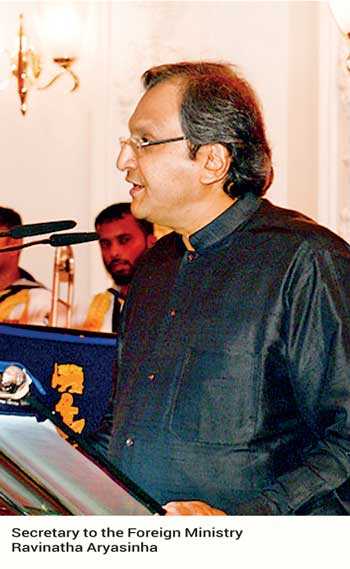Sunday Feb 22, 2026
Sunday Feb 22, 2026
Thursday, 24 October 2019 01:11 - - {{hitsCtrl.values.hits}}
Secretary to the Foreign Ministry Ravinatha Aryasinha has emphasised the urgent need for the development of an overarching security architecture and institutional frameworks that address the security issues in the Indian Ocean Region. Referring to the Track 1.5 Conference ‘The Indian Ocean: Defining our Future’ hosted by Sri Lanka in October 2018, which is to graduate to a Ministerial level conference, he noted that it held the promise of contributing to the development of an international rules-based order, with established rules and principles, operating on a common understanding of the challenges and solutions in the Indian Ocean region. He added that the finalisation of a Work Plan at the First Meeting of the Indian Ocean Rim Association for Regional Cooperation (IOR-ARC) Maritime Safety and Security (MSS) Working Group chaired by Sri Lanka and held in Colombo in August 2019, would also allow Member states to facilitate practical coordination to ensure sustainable economic development. 
The Secretary to the Foreign Ministry made these observations while delivering the Banquet Speech at the Galle Dialogue 2019, which brought together over 150 participants from 55 countries, heads of 12 international agencies and 3 defence industries, at the Galle Face Hotel in Colombo on 21 October 2019. He commended the Sri Lanka Navy for organising the two day event for the 10th successive year, and said, “This year’s theme ‘Refining Mindset to address Transnational Maritime threats: A Review of the Decade’, encourages deeper reflection. It acknowledges that not only have things around us changed, but that there is also a need for us to change the way we perceive them. It gives us the opportunity to re-energise, re-evaluate and re-calibrate, if needed, and to re-set the agenda for what is bound to be a critical decade ahead.”
Secretary Aryasinha also observed that “it is fitting that Sri Lanka, which, as early as in 1971 spearheaded the Indian Ocean Peace Zone (IOPZ) proposal at the UN and promoted the Indian Ocean Marine Affairs Cooperation (IOMAC) in 1985 - at a time when few recognised the importance of these concepts or supported these processes - continues to remain in the forefront in further efforts to ensure Freedom of Navigation and the safety and security of the Sea Lanes of Communication (SLOCs) in the Indian Ocean. These are essential pre-requisites not only in maintaining regional security and stability, but also crucial for the future prosperity of the region.”
Detailing the changing dynamics in the Indian Ocean, he said that the region’s littoral states, home to 35% of the world’s population, accounted for 18.5% of global GDP in 2018. One of the world’s busiest and most critical trade corridors, carrying two-thirds of global oil shipments and a third of bulk cargo and hosting the most critical SLOCs, it directly impacts global trade and the economy. He added that despite challenges, compared to some maritime regions, the Indian Ocean region presently enjoys a relative calm, due to a commendable willingness to adhere to the rule of law and maintain freedom of navigation in the Indian Ocean.
Addressing the threats faced by the region, he observed, “Acts particularly by non-state actors engaged in human smuggling, drug trafficking, sea piracy and terrorism may be better tackled with a mechanism to monitor a wider area of our oceans and share that information with likeminded entities both local and foreign.” The Secretary to the Foreign Ministry went on to note that “while legal frameworks will lay the foundation in protection of the oceans, practical cooperation among countries is the first line of defence against various transnational maritime threats faced.” He also cautioned that “while activities of non-state actors no doubt continue to threaten the security of the Indian Ocean, State actors must share in the blame for the instability that sometimes complicate our dealings with regard to the oceans.”
In his speech, the Secretary called particular attention to the geopolitical and geostrategic framing of the Indian Ocean that is currently taking place. “In these framings,” he emphasised, “the inherent role of the Littoral States must be recognised: it is necessary for the countries geographically located in the region, to play the leading role in deciding the future of the Indian Ocean Region.” Secretary Aryasinha called on policy makers and experts of the Indian Ocean Region “to adopt comprehensive and holistic approaches, which, while centrally serving respective national interests, factor within it all other individual country interests and key international commitments and obligations.”
“In the geostrategic contestations that arise that are extraneous to us,” he stressed, “we must not be forced in to taking sides, but be allowed to work in collaboration with all, to reconcile competing interests.”